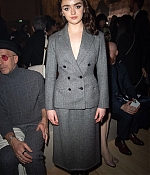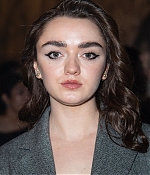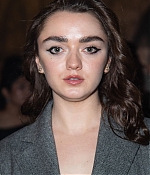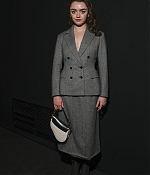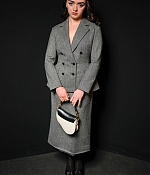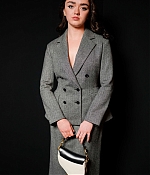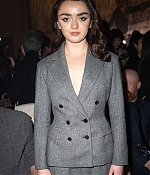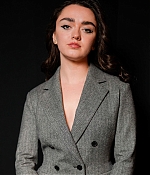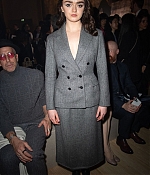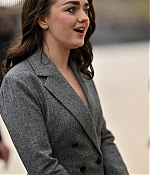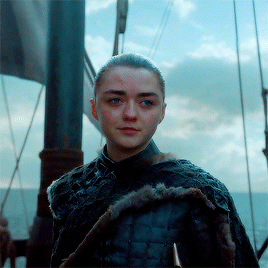

Maisie Williams shared her experience of visiting India for the Dior show. The actor, who played Arya Stark in Game of Thrones, praised the country’s culture.
Dior’s Mumbai show on Thursday was a star-studded event. Celebs from across the the world gathered at Mumbai’s Gateway of India for the show. From actor Freida Pinto to model Cara Delevingne and Bridgerton 2’s Simone Ashley, all were in attendance. Also present was Game of Thrones’ Maisie Williams. At the event, the actor spoke about her India trip. Also read: GOT star Maisie Williams arrives in Mumbai for Christian Dior show, is impressed with her desi hotel room
Maisie Williams sat in the front row alongside actor Sonam Kapoor at the recent Dior fashion show. She wore a red dress for the show. When asked about her experience in India, Maisie spoke about the culture and people of the country. The actor, who played Arya Stark in hit HBO series Game of Thrones, had arrived in Mumbai on Tuesday.
“I think that the culture is so beautiful. People are so kind, I felt so welcomed,” Maisie told Brut India as she attended the Dior show in Mumbai. Earlier, Maisie had shared a video from her hotel room in Mumbai. She had a tiny tika on her forehead, and wore a beaded necklace in the clip. Maisie showed around her room in the clip – from a picture of Lord Krishna on a wall to floral decorations on the floor. She said in the clip, “I just got to Mumbai and I am losing my mind a little bit.”
Bollywood celebs such as Rekha, Mira Rajput and Athiya Shetty, among others, mingled with the likes of Maisie, Cara and others at the Dior show. Never Have I Ever’s Poorna Jagannathan also made a red carpet appearance at the event. Thai actors Mile and Apo were also pictured at the event.
The guest list also included Radhika Merchant and Isha Ambani. Anushka Sharma along with cricketer-husband Virat Kohli, Sobhita Dhulipala, Ananya Panday, Khushi Kapoor, Karisma Kapoor, Diana Penty, Harsh Varrdhan Kapoor, Shweta Bachchan, Arjun Kapoor, Masaba Gupta and Natasha Poonawalla among others, also attended the Dior show. Designer Maria Grazia Chiuri, after wrapping up the event, posted a video with the models on Instagram. She wrote in her caption, “And it’s done! Thank you Mumbai for having us and thank you to the 99 wonderful girls who walked the show.”

The actor caught up ELLE UK following the Dior AW23 show in India to discuss fashion, beauty and her upcoming TV show, ‘The New Look’.
Obtaining a ticket to a Dior runway show, let alone one held halfway across the world, is the fashion world’s equivalent of a Willy Wonka Golden Ticket. And it’s a coveted opportunity that actor Maisie Williams – a friend and regular FROW attendee for the French fashion house – doesn’t take lightly.
On Thursday night, the British star – who recently announced her split from her boyfriend of five years, Reuben Selby – attended Dior’s AW23 presentation in Mumbai, India, alongside the likes of Bridgerton’s Simone Ashley, former ELLE UK cover star Naomi Ackie, actor Jessie Buckley and model Cara Delevingne.
Conceptualised by creative director Maria Grazia Chiuri, the collection featured a colour block sequence dedicated to vivid green, yellow, pink and purple silks. Threaded through the collection is a homage to French fashion designer Marc Bohan, with sari-inspired evening coats and skirts that create ‘a fascinating odyssey that transcends borders and era’. ‘My favourite look was this purple and green two piece of a knitted vest and cargo trousers,’ Williams tells ELLE UK from Mumbai. ‘I think they’re such interesting colours – the tied detail in the back makes it extra enticing, but the overall feeling of the outfit is so wearable and cool.’
For some, the choice of Mumbai might be surprising for a brand so synonymous with our Gallic neighbour. But, months after the fashion house presented its 2023 resort collection in Seville, Spain, Williams notes the importance of fashion brands celebrating local artisans and global cultures. ‘So much of our inspiration is drawn from different histories and heritages,’ she says. ‘It’s incredibly important that fashion brands not only use them as a creative inspiration, but also to give back and truly develop the techniques and inspiration so that they can live on; so that these techniques can be as beneficial to India and the craftsman who can do it, as well as the designers and the people who wear the clothing.’
For the show, the actor wore a maroon-hued pleated red mini dress and black strappy sandals. ‘The fabric was creased which gave the dress a more casual feel, which really suited the tone being in a warmer climate,’ she explains of the Dior dress. ‘I wore some flat sandals and they looked so good with my outfit, but we’re so easy to walk in. I had them on all day and all night.’
The 25-year-old former Game of Thrones star has become an avid follower of high fashion since she starred on the HBO medieval fantasy television series. In addition to becoming H&M’s global sustainability ambassador in 2021 and creative strategist and advisor to the platform Contact, which connects individuals working in creative industries, in May last year it was announced that Williams had been cast in the Apple drama series The New Look, starring as Catherine Dior, the younger sister of fashion designer Christian Dior and Legion d’Honmeur recipient for her efforts in the French resistance. ‘I had so much fun making this show and I think that it’s going to be really impactful,’ she says. ‘It will bring together my love for fashion and also my love for acting – that makes me really excited.’

Maisie attended the Christan Dior show during Paris Fashion Week! Photos have been added, enjoy.








Public Appearances > 2023 > February 28: Christian Dior : Photocall – Paris Fashion Week – Womenswear Fall Winter 2023-2024
Public Appearances > 2023 > February 28: Christian Dior : Show – Paris Fashion Week – Womenswear Fall Winter 2023-2024
Public Appearances > 2023 > February 28: Street Style – Paris Fashion Week – Womenswear Fall Winter 2023 2024 : Day Two
Public Appearances > 2023 > February 28: Christian Dior : Outside Arrivals – Paris Fashion Week – Womenswear Fall Winter 2023-2024

Maisie attended Paris Fashion Week today, photos of her appearance have been added to our gallery! Enjoy





Public Appearances > 2023 > January 23: Christian Dior : Photocall – Paris Fashion Week – Haute Couture Spring Summer 2023

The Bristolian actress opens up about her ambassador role and relying on charities to provide food during her childhood
- « Previous Page
- 1
- 2
- 3
- 4
- 5
- …
- 56
- Next Page »
